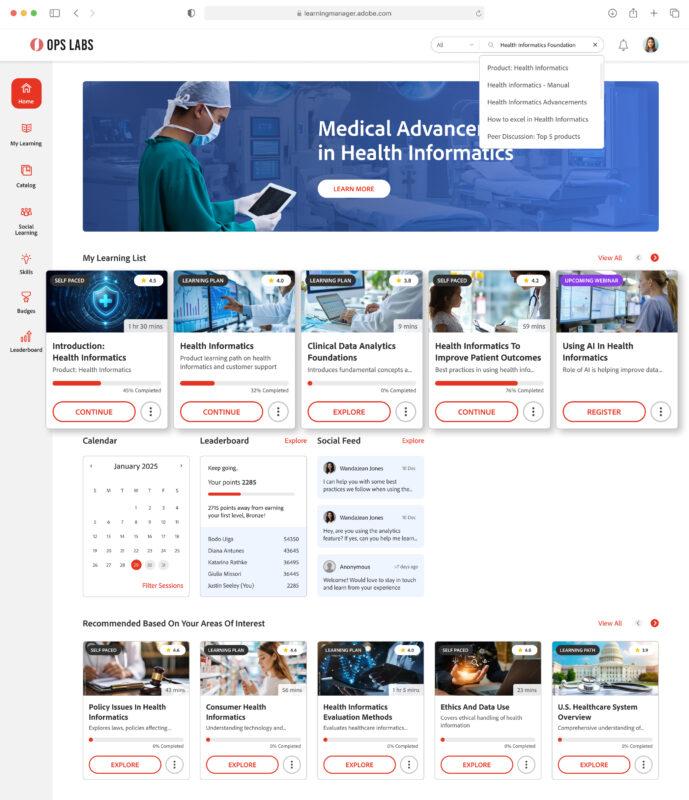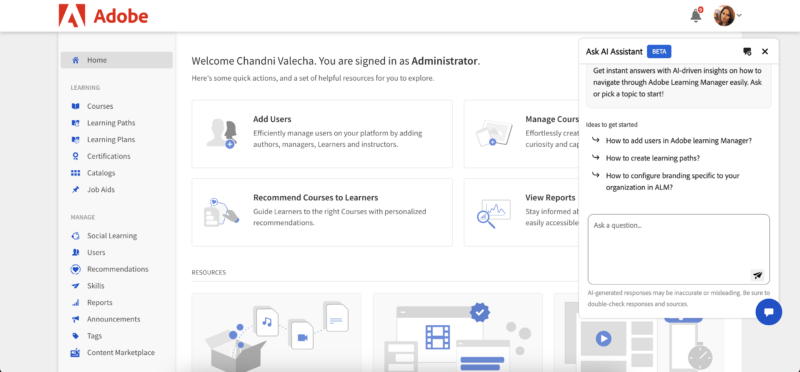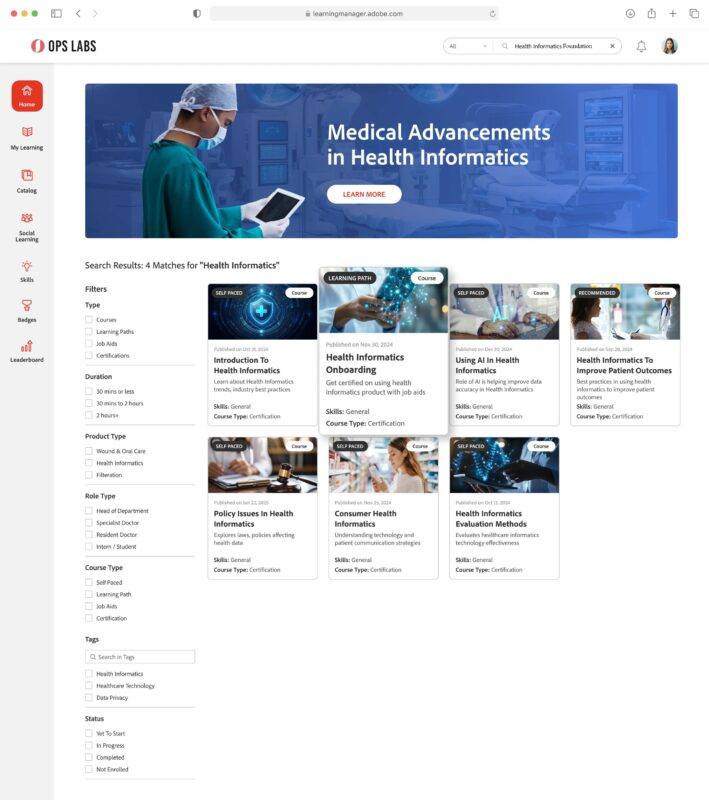Unlocking the Future of Learning: A Dive into Agentic Learning with Dr. Allen Partridge
Dr. Allen Partridge, Adobe’s esteemed Director of Digital Learning Evangelism, stands at the forefront of the eLearning revolution. Renowned for his impactful speeches and thought-provoking writings, he explores the realms of immersive learning, gamification, and AI-driven educational strategies. With a PhD in Interdisciplinary Studies that beautifully merges art, music, theater, philosophy, and computer science, Dr. Partridge exemplifies the creative and technical prowess essential for navigating today’s advanced learning landscape. In this interview, he shares insights about the transformative role of AI in content creation and curation, agentic learning, and the must-have tech features for future Learning Management Systems (LMS).
How Can AI Enhance Efficiency in L&D Teams?
AI shines as a powerful catalyst in Learning and Development (L&D), primarily acting as an accelerator rather than a disruptor. Rather than dismantling established workflows, AI enhances them—expediting content creation, refining search capabilities, and optimizing delivery for varied learner demographics. For instance, a global enterprise leveraged Adobe Learning Manager’s AI insights to efficiently train over 36,000 employees with 20% less administrative burden—achieving this without altering their foundational strategy. Similarly, a company effortlessly scaled its certification programs across 900+ locations using AI to personalize delivery, thus broadening its reach while minimizing operational hurdles.

These enhancements impact every phase of the learning cycle. AI’s abilities include assisting in content writing, dynamically building learning paths based on user engagement, and providing data-driven insights for administrators. The outcome? A faster, more relevant learning experience with improved decision-making, all while maintaining existing workflows.
Diving into Agentic Learning: A Tool for Enhanced Productivity
Agentic learning represents a pioneering AI approach where autonomous agents tailor the learning experience dynamically in response to learners’ goals, behaviors, and surroundings. Instead of fixed learning pathways, this model encourages more fluid and responsive learning experiences. Imagine a suite of specialized AI assistants—one curating timely resources, another guiding users towards mastery, and yet another recommending next steps based on progress.
The potential remains largely untapped, but its implications are impressive. Such agents could alleviate the burden of continuous manual curation, empowering learners with greater autonomy and allowing L&D teams to scale without losing relevance. Current platforms, like Adobe Learning Manager, are already adapting to support these intelligent, learner-focused experiences.
In beta, we are introducing an Admin AI Assistant to enhance the self-service experience for L&D administrators. This AI-driven tool aims to provide quick and accurate answers to common queries and troubleshoot issues efficiently without reliance on elaborate documentation.

Client Success Stories: The Fusion of AI and Human Expertise
Two notable examples highlight the synergistic power of AI and human collaboration. A global airline with a vast franchise model faced the monumental task of training thousands across multiple regions. Their L&D team harnessed Adobe Learning Manager to integrate AI-driven content recommendations, making the most relevant resources accessible for every learner based on their role and geographic location. This human-led strategy saw a 20% reduction in administrative tasks while bolstering engagement throughout the enterprise.
In another instance, a leading prosthetics manufacturer turned to Adobe Learning Manager to streamline educational pathways for both clinicians and patients. By consolidating several platforms into one, they delivered tailored certification programs powered by AI—matching content to specific learner roles and needs. Here, AI played a supporting role, refining search capabilities and personalizing delivery across over 900 clinics, all while keeping human oversight at the forefront of program design.
In both cases, the narrative transcended the concept of replacement; it expressed empowerment. AI extended the reach, accelerated delivery, and personalized experiences while allowing human experts to focus on quality and context.
Must-Have AI Features in a Next-Gen LMS
It can be tempting to chase after a checklist of AI functionalities, yet the true value emerges when AI is seamlessly integrated throughout the entire learning experience. Leading LMS solutions harness AI not just as an add-on but as a key driver in content creation, personalized learning pathways, skills development, and streamlined operations—all while preserving trusted processes.
Organizations should seek systems that facilitate smooth transitions from recruitment to onboarding, enabling new employees to acclimate quickly through automated, context-aware journeys. AI assists learners in identifying skills gaps, mapping their career paths, and tracking their progress effortlessly. Features like headless delivery and open APIs enhance integration with enterprise systems while providing customized experiences.
AI-enhanced search and recommendation functions help filter relevant content effectively, while conversational agents offer microlearning and on-the-spot support. Additionally, models for peer-based recommendations, refreshing content catalogs, and dynamic learning pathways ensure long-term relevance.
For instance, Ops Labs—our hypothetical healthcare organization—utilized AI-driven search to assist doctors. When a user types in “Health Informatics Foundation,” the system prioritizes “Health Informatics” as the core keyword, displaying all pertinent courses centered around the fundamentals of that subject.

Engagement can also be fostered through gamification, social recognition, and user-generated content, allowing for a vibrant learning culture. For administrators, integrations with HRMS and performance tracking tools enable real-time insights into learning applications and business impacts.
Ultimately, AI’s true worth in an LMS lies not in novelty but in its ability to subtly and effectively support learners and L&D leaders at every step of the way.
The Future of Generative AI in Learning
Looking forward, generative AI is set to not only assist in content creation but also in its maintenance and evolution, evolving into a co-author and silent editor. Imagine an AI that recalls every course launched, reviews existing materials, and suggests timely updates in response to emerging skills or shifts in business strategy—keeping your learning library fresh without any manual effort.
We’re also on the brink of proactive learning agents—tools designed to monitor contextual cues (like calendar events or current news) and deliver just-in-time training before crucial meetings. Combine this with intelligent assistants embedded within your ecosystem, and L&D can transition from a reactive posturing to an anticipatory, forward-thinking approach.
Over time, generative AI will mature into a design partner that fosters learner growth, keeps designers adept, and cultivates adaptive learning ecosystems reflective of the diverse needs of the people they serve.
Conclusion
We extend our gratitude to Dr. Allen Partridge for enlightening us on the transformative potential of agentic AI in learning and how an effective LMS can reshape L&D experiences. If you’re eager to discover more about Adobe’s AI capabilities, take a look at their extensive feature list.



